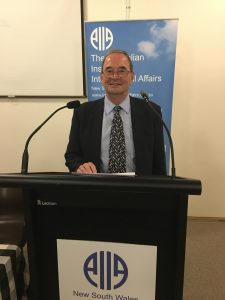The Prospects for Syria
Former Australian ambassador to Syria Robert Bowker discussed Syria on 25th July at Glover Cottages. He looked at three aspects: factors that have led to the stabilization of the Assad regime, a future contest of control with Islamic State, and challenges of rebuilding in a post-conflict era. With strong support from Russia and Iran, Assad is in a position to maintain control, and while not ideal, it remains the best option available to the global community. Prospects for rebuilding the nation remain a distant dream.
Despite US accusations of war crimes by Assad and calls for more direct intervention, no consensus on what to do exists in Washington, and heavy military intervention remains out of the question. But collapse of the regime would be catastrophic. An outpouring of refugees would likely lead to the overcapacity and collapse of Lebanon and Jordan. As a result, the U.S. is seeking to distance itself as much as possible from fuelling the war. This was recently reinforced by the U.S. ending the CIA program to fund selected groups of Syrian rebels. Conversely, that does not mean unconditional support for Syria and its allies. Iran, among other actors, would gain strategically from such a situation.

Bowker examined the contention that ISIS will lose control of most of its strongholds about 12 months from now. Maybe so, but with a strong leadership structure, territorial loss would not be the end of that organisation. Instead ISIS will return to what it does best – guerrilla warfare. Bowker said that a prevailing opinion in the Middle East is that by creating its predecessors, the US and Israel actually created ISIS. Having lost its caliphate in Mosul, ISIS will establish it elsewhere. Furthermore, ISIS attracted about 15,000 foreign fighters and with Mosul’s defeat, these men will return to their home countries (mainly in the Middle East and North Africa) and share their military experience and knowledge with others. ISIS may have been pushed out of territory but it will probably appear elsewhere.
Bowker ended on a pragmatic note. The U.S. sees its task as “remaking” the Middle East. Russia believes this is impossible, and its limited objective is to mitigate damage to Assad’s regime which will be in its own strategic interests. Bob Bowker’s view is that even if some kind of negotiated peace could be achieved tomorrow, it would take considerable time for stability to return to the region.
Damian Meduri
Intern at AIIA NSW